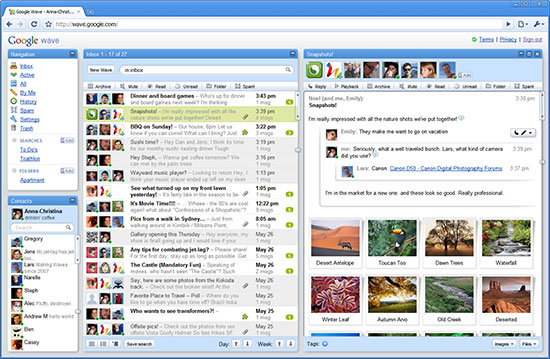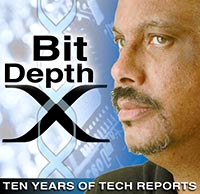BitDepth 684 - June 16
15/06/09 20:22 Filed in: BitDepth - June 2009
Google introduces its new "Wave"...
Google churns a big Wave

This is the only official image available of Google's Wave. Amid the apparent clutter is a surprising wealth of potential. Image courtesy Google.
On May 28, the two big players on the web made big announcements.
Microsoft held a new conference to announce its rebranding and reengineering of its search service, now dubbed Bing, which wags have suggested is an acronym for But It's Not Google.
But Microsoft's big badda bing was eclipsed by another press conference later in the day at the Google Developer conference in San Francisco, as the leading search company announced an initiative that pushed further into Microsoft's territory with a demonstration of a new product called Wave.
Microsoft's Bing earned polite and well-considered applause, but Wave, which is yet to be fully proven as a product, sent web pundits, in a word, crazy.
Bing builds on the solid efforts that Microsoft has been making in search. The product that's being shelved, Live Search, always did an exemplary job of returning search results based on my name, my mesturbatory test for any service.
Bing incorporates what the development team describes as a "decision engine," built utilising semantic technology from corporate acquisition Powerset, which will delivers smart results in more useful formats.
The idea of useful search is becoming more pervasive on the web, and another recently unveiled search engine, Wolfram Alpha, offers results that are less about web links than about computing analysis. You don't search for websites on Wolfram Alpha, you seek answers to the kind of questions you always imagined putting to a computer, albeit without the super coolness of actually speaking the queries aloud and hearing a response from Majel Barett.
Google moves further beyond search
Most crucially, the likelihood that Google will ignore any successful advances that become popular on either Bing or Wolfram Alpha trends toward zero.
Meanwhile, the search giant is clearly working to find new revenue streams and business models.
Wave deepens the company's efforts to move computing to the "cloud," building on increased connectivity and faster access to the Internet.
The company first created Google Docs, web versions of the Microsoft Office stalwarts Word, PowerPoint and Excel, and then introduced Gears, software that allowed the web applications to work without a connection to the Internet.
All this despite a recent two-hour outage in its services on May 14 that shook web users and reduced Google related traffic on the web by a startling percentage. For most users, Wave is still vaporware, a video, a screenshot and a well-received demonstration of the project.
What's in the Wave?
What we can glean from the video of the keynote is that Wave taps into existing Google services, offering live translation, intuitive spell checking and impressive text handling capabilities developed for existing web products.
The demo of Wave boasts some intriguing developments, like live transmission of typed characters (available in GTalk) and a "playback" feature that allows people who have just joined a subject thread to see what happened before prior to their arrival.
Developer and presenter Lars Rasmussen noted that "we're showing you this with rich text documents, but there's no reason why we wouldn't build spreadsheet and presentation capabilities into it later on."
For all these bells and whistles, the killer feature of Google's Wave is likely to be its licensing terms. Google Wave is both extensible and open source, which is likely to lure the pool of programmers that built software like Firefox into spunky alternatives who will probably extrapolate Wave in surprising and unexpected directions.
Right now, Wave has the hooks to be a remarkable web based collaboration tool that builds on the immediacy of Twitter and the multiuser hooks of Google Docs. Tomorrow? Who knows where open source Wave developers will take the web?
Links
Zoho on Google and Microsoft
Google's outage

This is the only official image available of Google's Wave. Amid the apparent clutter is a surprising wealth of potential. Image courtesy Google.
On May 28, the two big players on the web made big announcements.
Microsoft held a new conference to announce its rebranding and reengineering of its search service, now dubbed Bing, which wags have suggested is an acronym for But It's Not Google.
But Microsoft's big badda bing was eclipsed by another press conference later in the day at the Google Developer conference in San Francisco, as the leading search company announced an initiative that pushed further into Microsoft's territory with a demonstration of a new product called Wave.
Microsoft's Bing earned polite and well-considered applause, but Wave, which is yet to be fully proven as a product, sent web pundits, in a word, crazy.
Bing builds on the solid efforts that Microsoft has been making in search. The product that's being shelved, Live Search, always did an exemplary job of returning search results based on my name, my mesturbatory test for any service.
Bing incorporates what the development team describes as a "decision engine," built utilising semantic technology from corporate acquisition Powerset, which will delivers smart results in more useful formats.
The idea of useful search is becoming more pervasive on the web, and another recently unveiled search engine, Wolfram Alpha, offers results that are less about web links than about computing analysis. You don't search for websites on Wolfram Alpha, you seek answers to the kind of questions you always imagined putting to a computer, albeit without the super coolness of actually speaking the queries aloud and hearing a response from Majel Barett.
Google moves further beyond search
Most crucially, the likelihood that Google will ignore any successful advances that become popular on either Bing or Wolfram Alpha trends toward zero.
Meanwhile, the search giant is clearly working to find new revenue streams and business models.
Wave deepens the company's efforts to move computing to the "cloud," building on increased connectivity and faster access to the Internet.
The company first created Google Docs, web versions of the Microsoft Office stalwarts Word, PowerPoint and Excel, and then introduced Gears, software that allowed the web applications to work without a connection to the Internet.
All this despite a recent two-hour outage in its services on May 14 that shook web users and reduced Google related traffic on the web by a startling percentage. For most users, Wave is still vaporware, a video, a screenshot and a well-received demonstration of the project.
What's in the Wave?
What we can glean from the video of the keynote is that Wave taps into existing Google services, offering live translation, intuitive spell checking and impressive text handling capabilities developed for existing web products.
The demo of Wave boasts some intriguing developments, like live transmission of typed characters (available in GTalk) and a "playback" feature that allows people who have just joined a subject thread to see what happened before prior to their arrival.
Developer and presenter Lars Rasmussen noted that "we're showing you this with rich text documents, but there's no reason why we wouldn't build spreadsheet and presentation capabilities into it later on."
For all these bells and whistles, the killer feature of Google's Wave is likely to be its licensing terms. Google Wave is both extensible and open source, which is likely to lure the pool of programmers that built software like Firefox into spunky alternatives who will probably extrapolate Wave in surprising and unexpected directions.
Right now, Wave has the hooks to be a remarkable web based collaboration tool that builds on the immediacy of Twitter and the multiuser hooks of Google Docs. Tomorrow? Who knows where open source Wave developers will take the web?
Links
Zoho on Google and Microsoft
Google's outage
blog comments powered by Disqus

